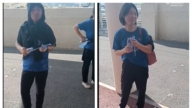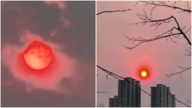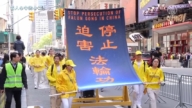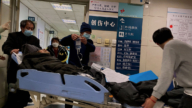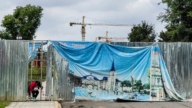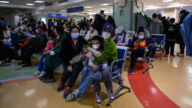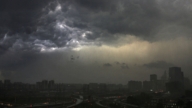【新唐人2014年02月27日訊】近期,中國大陸超過十分之一國土籠罩在嚴重霧霾下,其中以北京、天津、河北省多個城市最為嚴重。面對嚴重超標的空氣污染指數,河北石家莊居民李貴欣做出了一項驚人創舉:他狀告石家莊環保局失職,並要求損害賠償1萬元人民幣。
從20號開始,河北省大部分地區已連續7天出現霧霾。22號下午,河北省氣象臺發佈首個霾橙色預警信號,截至25號下午5點,共發佈了10次霾橙色預警信號。
中共環保部通報說,截至24號,實施空氣質量新標準監測的161個城市中,有57個城市達重度及以上污染,其中15個城市是嚴重污染。
據大陸《中新社》報導,大陸10%國土持續重霾,不少地方PM2.5指數超過500,而國際衛生組織認為的安全指數則小於10。另據中共國家氣象中心的數據,25號早晨,北京的PM2.5指數為444。
「中國法學會法理學研究會」顧問郭道暉:「北京的霧霾就是長期積纍的問題爆發了,那是我們過於偏重於GDP去發展,而不顧生態環境受到破壞,那是領導決策的失誤。在治理上,剛開始也是不太重視。最近這幾天倒是發出了所謂橙色的警告。」
「四川大學環境科學與工程研究所」所長艾南山:「不是短期內可以解決的。北京本身,很多工業、企業已經遷走了,但是河北省工業區很多,好多煙囪在吹,好多煉鋼、煉鐵的,所以現在的霧霾比較嚴重,都是周圍的東西成片的污染。」
19號上午,河北省石家莊市新華區居民李貴欣拿著一份行政訴狀,先後到省高院、石家莊市中院申請立案,但都未被受理。
訴狀中的被告是石家莊市環境保護局,李貴欣不僅要被告依法履行治理大氣污染的職責,他還就大氣污染對他造成的損失,提出由被告支付1萬元人民幣的經濟賠償。
20號上午,石家莊空氣質量指數達337,屬嚴重污染,李貴欣再一次拿著行政訴狀到法院申請立案,這一次,石家莊市裕華區人民法院接收了他的訴訟材料。七個工作日內將給予是否受理的答復。
大陸《燕趙都市報》報導說,李貴欣在提起訴訟之前,蒐集了大量的資料,認真查閱了石家莊市環保局網站公布的數字,並根據數字統計出去年石家莊的平均污染指數為247,屬於重度污染的數值範圍。
李貴欣是第一個因霧霾天氣,將政府職能部門告上法庭的中國公民。他在接受《燕趙都市報》採訪時表示:損害已經發生,施害一方卻無法確認,因此必須得找管理部門 — 環保局。而賠償要求即使不被支持,打這個官司本身也是種勝利。他說,他的行為實際上是一種「喚醒」:喚醒民眾的法律意識,維護自身權益﹔喚醒環境執法部門採取有力手段,讓老百姓能呼吸上新鮮空氣﹔同時也喚醒政府、和立法部門關注環境問題,大力治污。
艾南山:「當然是可以狀告,環保局也要負責任,當然政府要負責任,其實,環保局負的責任不及發改委負的責任大。」
郭道暉:「憲法規定,公民有對政府機關,對政府工作人員違法違憲的事情,進行舉報、控訴、申訴等權利。當然這個問題是不是環保局的問題,我看還不是,不完全是,這個應該中國人大做出決議,責成有關政府部門把這個問題好好研究、撥款治理。單單一個環保局,我看它也沒有那麼大的權力。」
大陸陷入長達一週的重度霧霾天氣,正在大陸訪問的瑞典外交大臣卡爾.比爾特25號在新浪微博上PO文說,「霧霾讓人不舒服而且對身體有害。」美國《彭博社》則表示,從污染程度看,北京和周邊山區城市張家口,已經喪失申辦2022年冬奧的資格。
《彭博社》網站23號一篇題為「再見,索契殘雪﹔你好,中國霧霾?」的報導指稱,還有甚麼比索契這個滿是棕櫚樹、沒有雪的亞熱帶地區搞冬奧會更糟糕的事嗎?或許那就是﹕在大陸污染最嚴重省份的山區內進行滑雪比賽,在乾燥、霧霾籠罩的平原舉辦冬奧開幕式吧!
採訪/常春 編輯/陳潔 後製/李勇
Man Sues Chinese Regime Over Air Pollution
Recently, more than 10 percent of Mainland China
has been shrouded by severe smog.
Several cities including Beijing, Tianjin, Hebei Province
are the worst.
Hebei resident Li Guixin is suing Shijiazhuang Environmental
Protection Bureau (EPB) regarding the severity of the foul air.
Li is also seeking 10,000 Yuan (US $1,633) compensation
from the bureau.
Since Feb. 20, most areas in Hebei Province have had
smoggy weather for seven consecutive days.
On Feb. 22, Hebei Meteorological Center
issued its first orange alert.
By 5:00 p.m. Beijing time on Feb. 25,
ten orange warnings had been issued.
The environmental ministry reported that by the end
of Feb. 24, among 161 monitored cities,
57 cities had been hit by heavy air pollution
and among them 15 cities were most severe.
China News Service reports that 10 percent of China
is continuously enveloped in heavy air pollution.
In many locales, the level of tiny particles, known as PM2.5,
reached over 500.
The World Health Organization recommends a safe level
of particles with a diameter of no more than 10.
The National Meteorological Center’s data shows that
Beijing’s PM2.5 reached 444 on the morning of Feb. 25.
Guo Daohui, China Law Society consultant: “Beijing smog
is caused by long-term accumulation of problems, which has
resulting in crisis.
The regime has been overly concentrated
on the so-called GDP development.
They ignored the environmental damaging,
a mistake by the leadership.
The regime wasn’t concerned about resolving
the pollution in the beginning.
Over the past few days, the regime has issued
the so-called orange alerts."
Ai Nanshan, director of the College of Architecture
and Environment at Sichuan University:
“It cannot be cured in a short time.
Many industries and enterprises have moved out of Beijing.
However, there are many industrial zones in Hebei.
Many chimneys are blowing and the steel and iron factories
are running, so the air pollution is severe over there.
The surrounding areas have gradually become polluted
little by little."
On the morning of Feb. 19, Li Guixin of Hebei went
to the provincial high court and Shijiazhuang Intermediate
Court to sue the local regime over the smog.
But the lawsuit wasn’t accepted.
Li sued the local EPB and requested them to perform
their duty of controlling air pollution according to the law.
He also requested compensation from the bureau
of 10,000 Yuan ($1,633) for his economic losses.
On Feb. 20, Shijiazhuang’s PM2.5 hit 337, which
is within the heavy pollution range.
Li again went to the court and requested to file a lawsuit.
Yuhua District People’s Court in Shijiazhuang City
accepted his complaint this time.
The court will decide whether it will hear the lawsuit
or not within seven days.
A local newspaper reported that before Li Guixin
submitted his complaint,
he researched the EPB’s data and collected
a large amount of information.
Using EPB’s data he calculated that the average PM2.5
in Shijiazhuang last year was 247.
This figure is within the heavy pollution range.
Li Guixin has become the first person in China
to sue the regime for failing to curb air pollution.
He told the local newspaper in an interview that damage
has occurred but the party cannot confirm the victims.
So he must talk to the EPB.
Even though it’s unlikely his compensation request will be
accepted, the lawsuit itself can still be considered a victory.
Li believes his acts are a kind of wake up call: to awaken
the citizens’ legal awareness, maintaining their rights;
to awaken the regime to implement a practical action plan
so that citizens have the chance to breathe fresh air;
meanwhile, to awaken the regime and law organs to show
concern over the environmental pollution in order
to vigorously solve the problems.
Ai Nanshan: “Certainly one can sue them, the EPB
should also take responsibility.
The regime should also take responsibility.
Actually, EPB’s responsibility is less than that
of the National Development and Reform Commission."
Guo Daohui: “The law says that a citizen has the right to
report, petition, and appeal if the governmental
organs and its staff break the law.
Is it the EPB’s duty? Not entirely.
The National People’s Congress should decide
and submit the issue to the governmental agencies
so that they can do some research and get the funds
to cut the pollution.
EPB alone doesn’t have a lot of power."
The severest smog in China has lasted for almost a week.
Carl Bildt, the Swedish foreign minister, is visiting China.
He posted a Sina Weibo update on Feb. 25 that said,
“Unpleasant and hazardous now."
Bloomberg suggests that regarding the degree of air pollution,
Beijing-Zhangjiakou is not capable of meeting the standard
to bid on the 2022 Winter Olympic Games.
BloombergView published an article on Feb. 23 titled
“Goodbye, Sochi Slush. Hello, China Smog?" which read,
What’s worse than a snowless, subtropical Winter Olympics
like the one that wrapped up in palm-tree-lined Sochi, Russia,
this weekend?
How about an opening ceremony on an arid, smog-choked
plain and skiing events in the mountains
of the most polluted province in all of China?”
Interview/Chang Chun Edit/Chen Jie Post-Production/Li Yong



